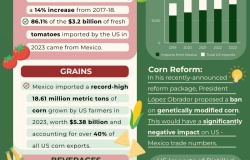Book Launch: Uneasy Neighbo(u)rs: Canada, the USA and the Dynamics of State, Industry and Culture
Authors David T. Jones and David Kilgour discussed their book, which assesses the dynamics that led to the societal, institutional, and ideological differences between the United States and Canada.
Overview
The success of the bilateral relationship between Canada and the United States can be explained by a number of factors ranging from geography to close economic ties, to similar national perspectives on the value and importance of democracy, human rights, and the rule of law. Despite these similarities, the two countries have often held widely contrasting views on foreign policy, social welfare, and the military.
On December 17, 2007, the Canada Institute hosted David T. Jones, former U.S. diplomat for a discussion of his newly published book, Uneasy Neighbo(u)rs: Canada, the USA and the Dynamics of State, Industry, and Culture. The book, co-authored by former Deputy Speaker of Canada's House of Commons David Kilgour, assesses the dynamics that led to the societal, institutional, and ideological differences between the two countries, while also exploring how Americans and Canadians perceive their respective values and defining historical moments in an effort to better understand the intricacies of the Canada-U.S. relationship.
During his introduction of Jones, David Biette, director of the Canada Institute, described Uneasy Neighbo(u)rs as a thought provoking analysis of the Canada-United States relationship. Biette went on to say that the book convincingly documents the "acknowledged realities and unspoken observations" Canadians and Americans make about each other and provides useful insights into the varying behavior of both countries.
Jones began his presentation discussing how the conceptual framework for Uneasy Neighbo(u)rs was developed, noting that his work in and frequent travel to Canada as a U.S. diplomat allowed him to develop an appreciation of the differences between Canada in the United States. He said the purpose of writing Uneasy Neighbo(u)rs was to present Canadian and U.S. perspectives on issues such as health care, governance, foreign affairs, and security, in a way that would reflect and highlight the similarities and differences of both countries.
Jones said that he hoped the book would help dispel some of the common misperceptions Canadians and Americans have about one another. In the area of health care, Jones pointed out that while Canadians tend to perceive their health care system as superior to the United States', both countries face similar problems in maintaining their respective health care systems that are often overlooked. For instance, both Canada and the United States are struggling to cope with the increasing costs of maintaining a healthy and productive population. Rather than recognizing and discussing approaches to solving common challenges in the realm of health care—such as promoting healthier lifestyles—Canada and the United States continue to "talk past one another" when it comes to health care issues, said Jones.
Although the differences between Canadians and Americans was the focus of Uneasy Neighbo(u)rs, the close bilateral relationship between Canada and the United States should serve as a reminder of how much the two countries have in common. To illustrate this point, Jones paraphrased a quote—adapted from a speech given by John F. Kennedy—from Uneasy Neighbo(u)rs that aptly describes the bilateral relationship between Canada and the United States: "Geography has made us neighbors, history has made us allies, and economics has made us business partners, but we are friends by choice."
Drafted by Ken Crist, Program Associate
David Biette, Director, Canada Institute
202-691-4270
Hosted By

Canada Institute
The mission of the Wilson Center's Canada Institute is to raise the level of knowledge of Canada in the United States, particularly within the Washington, DC policy community. Research projects, initiatives, podcasts, and publications cover contemporary Canada, US-Canadian relations, North American political economy, and Canada's global role as it intersects with US national interests. Read more
Thank you for your interest in this event. Please send any feedback or questions to our Events staff.










